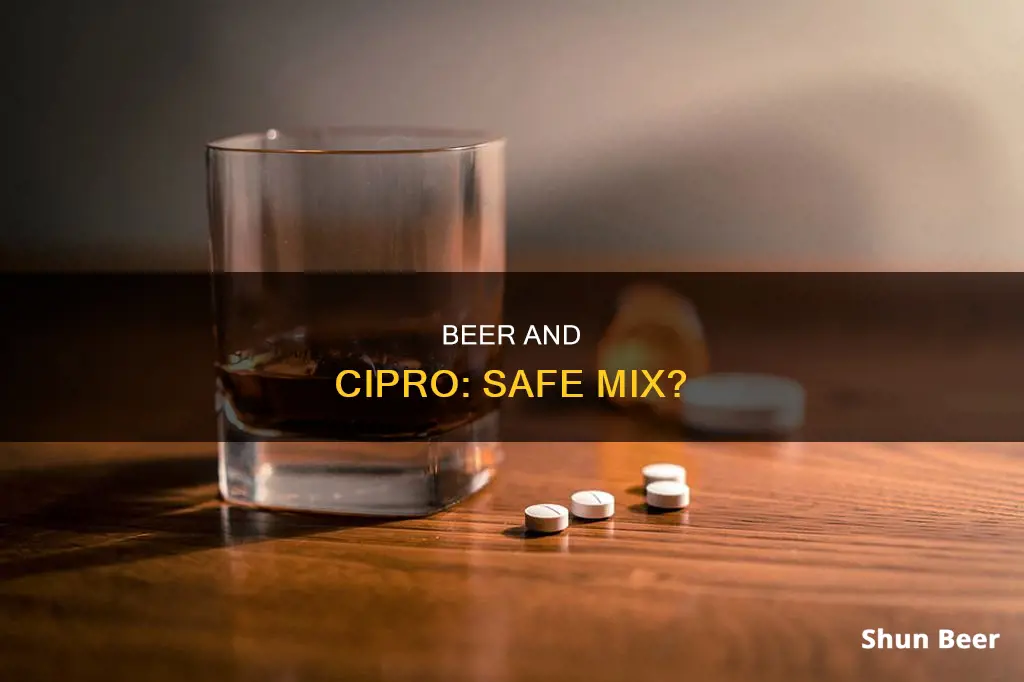
Cipro (ciprofloxacin) is a prescription drug used to treat bacterial infections. While there is no known interaction between Cipro and alcohol, consuming alcohol while taking Cipro may worsen the drug's side effects, such as nausea and vomiting. Additionally, alcohol can lead to dehydration, which can increase the risk of developing crystalluria, a side effect of Cipro. Therefore, it is generally recommended to avoid alcohol while taking Cipro. It is always advisable to consult a doctor or pharmacist about any potential interactions before consuming alcohol with antibiotics.
| Characteristics | Values |
|---|---|
| Alcohol interaction with Cipro | There is no known interaction between Cipro and alcohol. However, drinking alcohol while taking Cipro could worsen some of the drug's side effects, such as nausea and vomiting. Alcohol can also lead to dehydration, which may increase the risk of developing small stones in the urine, a known side effect of Cipro. |
| Drug interactions | Cipro can interact with certain other drugs, including tizanidine, warfarin, omeprazole, theophylline, sildenafil, zolpidem, nonsteroidal anti-inflammatory drugs (NSAIDs), macrolide antibiotics, sulfonylureas, antipsychotics, antacids, antidepressants, and antiarrhythmics. These interactions can increase the risk of side effects or make Cipro less effective. |
| Food interactions | Cipro may interact with certain foods and drinks, including dairy products (milk, yogurt) and calcium-fortified foods and juices. These interactions can reduce the absorption of Cipro and decrease its effectiveness. |
| Supplement interactions | Cipro may interact with mineral supplements containing magnesium, calcium, zinc, and iron, as well as multivitamins containing these minerals. These interactions can reduce the absorption of Cipro and decrease its effectiveness. |
What You'll Learn
- Cipro is a prescription drug used to treat bacterial infections
- It is safe to drink alcohol while on Cipro but it may worsen side effects like nausea and vomiting
- Alcohol may also cause dehydration, increasing the risk of crystalluria, a side effect of Cipro
- Dairy products and calcium-fortified foods may reduce the effectiveness of Cipro
- Cipro interacts with several other drugs, including antidepressants and antacids

Cipro is a prescription drug used to treat bacterial infections
Cipro can interact with certain other drugs, supplements, and foods. It is important to inform your doctor and pharmacist about any other medications, vitamins, or supplements you are taking before starting treatment with Cipro. Some known interactions include increased side effects from antidepressants, antiarrhythmics, and nonsteroidal anti-inflammatory drugs (NSAIDs). Cipro should also not be taken with mineral supplements such as magnesium, calcium, zinc, and iron, as they can decrease the level of the drug in the body and reduce its effectiveness. Similarly, Cipro should not be taken with dairy products or calcium-fortified foods, as they can also reduce the drug's absorption and effectiveness.
There is no known interaction between Cipro and alcohol. However, drinking alcohol while taking Cipro can worsen some of the drug's side effects, such as nausea and vomiting. Alcohol can also cause dehydration, which may increase the risk of developing small stones in the urine, a known side effect of Cipro. Therefore, it is generally recommended to avoid alcohol while taking this medication.
Beer and Tylenol: Safe Mix?
You may want to see also

It is safe to drink alcohol while on Cipro but it may worsen side effects like nausea and vomiting
It is generally safe to drink alcohol while taking Cipro (ciprofloxacin), a broad-spectrum antibiotic used to treat bacterial infections. However, alcohol may worsen some of the drug's side effects, such as nausea and vomiting.
Cipro is not known to interact with alcohol, and studies have shown that alcohol consumption does not interfere with the antibiotic's effectiveness. Nonetheless, drinking alcohol while taking Cipro may increase the severity of certain side effects. Both Cipro and alcohol can cause nausea, so consuming them together may compound this effect. Other possible side effects of mixing Cipro and alcohol include redness or flushing of the face, digestive problems, and liver failure.
Additionally, it is important to stay hydrated while taking Cipro as one of the known side effects is crystalluria, or small stones in the urine, similar to kidney stones. Alcohol can lead to dehydration, increasing the risk of developing these stones. Therefore, it is generally recommended to limit alcohol consumption or wait until the infection has cleared and you are off the medication before drinking.
If you are taking Cipro and wish to consume alcohol, it is important to consult your doctor, as they can advise you on whether and how much alcohol is safe to drink while taking this medication.
Beer and Zarelto: Safe or Not?
You may want to see also

Alcohol may also cause dehydration, increasing the risk of crystalluria, a side effect of Cipro
Cipro (ciprofloxacin) is a prescription drug used to treat bacterial infections. While there is no known interaction between Cipro and alcohol, consuming alcohol while taking Cipro could worsen some of the drug's side effects, such as nausea and vomiting. Additionally, alcohol can lead to dehydration, which increases the risk of crystalluria, a side effect of Cipro.
Crystalluria is a condition characterised by the presence of small stones in the urine, similar to kidney stones. Dehydration caused by alcohol consumption can increase the risk of developing these stones. Therefore, it is generally recommended to avoid alcohol while taking Cipro to reduce the risk of dehydration and the associated side effects.
The effectiveness of Cipro may also be impacted by alcohol consumption. Alcohol can affect the pathways that Cipro uses to treat infections in the body, potentially making the drug less effective. It is important for individuals taking Cipro to stay hydrated to mitigate the risk of crystalluria and other related complications.
It is always advisable to consult with a doctor or pharmacist before consuming alcohol while taking any medication, including Cipro. They can provide personalised recommendations and advice based on individual health conditions and factors.
Afib and Alcohol: Is Drinking Beer Safe?
You may want to see also

Dairy products and calcium-fortified foods may reduce the effectiveness of Cipro
The calcium present in dairy products can lower the absorption of Cipro in the body, which may result in reduced effectiveness of the medication. This could lead to an undertreated infection. Therefore, it is recommended to avoid consuming milk, cheese, and yogurt, or calcium-fortified drinks, such as dairy-free milk or calcium-fortified juices, with Cipro. However, it is considered acceptable to take Cipro with a meal that contains a small amount of dairy, such as buttered noodles.
To minimize the interaction between Cipro and dairy products or calcium-fortified foods, it is advised to separate their consumption by at least two hours. This means taking Cipro at least two hours before or after consuming dairy products or calcium-fortified foods. This will help ensure that the medication is effectively absorbed into the body.
It is important to follow the instructions provided by your healthcare provider or pharmacist regarding the consumption of dairy products and calcium-fortified foods while taking Cipro. They may provide specific guidelines or alternatives to ensure the medication's effectiveness.
Drinking and Driving: Is it Ever Safe?
You may want to see also

Cipro interacts with several other drugs, including antidepressants and antacids
Cipro (ciprofloxacin) is a prescription drug used to treat certain bacterial infections. It can interact with other medications, supplements, and foods. It is important to inform your doctor and pharmacist about any prescription, over-the-counter, or other drugs you take before starting Cipro treatment to prevent possible interactions.
Cipro interacts with certain antidepressants, including:
- Duloxetine (Cymbalta)
- Venlafaxine (Effexor XR)
- Sertraline (Zoloft)
- Citalopram (Celexa)
- Fluoxetine (Prozac)
Taking Cipro with these antidepressants can increase the risk of side effects from both Cipro and the antidepressant. Both Cipro and certain antidepressants have a risk of abnormal heart rhythm as a side effect, and taking them together could further increase this risk.
Cipro also interacts with certain antacids, such as:
- Aluminum hydroxide/magnesium hydroxide (Maalox)
- Calcium carbonate (Tums)
Taking Cipro with these antacids can make Cipro less effective than usual. The calcium, magnesium, or aluminum in the antacid may attach to Cipro, preventing its absorption and reducing its level in the body. Therefore, it is recommended to take Cipro at least 2 hours before or 6 hours after consuming these antacids.
In addition to antidepressants and antacids, Cipro interacts with several other drugs, including antiarrhythmics, macrolide antibiotics, sulfonylureas, antipsychotics, nonsteroidal anti-inflammatory drugs (NSAIDs), and others. These interactions can increase the risk of side effects or affect the effectiveness of Cipro.
Beer and Vicadin: A Safe Mix?
You may want to see also
Frequently asked questions
There is no known interaction between Cipro and alcohol, and studies have shown that drinking alcohol will not interfere with the effectiveness of the antibiotic. However, it is important to stay hydrated while taking Cipro as one of the known side effects is crystalluria (small stones in the urine). Alcohol can often lead to dehydration, which will increase the risk of developing these small stones, so it is probably best to avoid alcohol while taking this medication.
Drinking alcohol while taking Cipro could make certain side effects of the drug worse, including nausea and vomiting. Alcohol consumption can occasionally cause nausea, which may be compounded by the nausea that may also result from taking Cipro.
Cipro has some common side effects, including feeling sick (nausea), redness or discomfort in the eye, a bad taste in the mouth, and white specks on the surface of your eye. These side effects are not considered life-threatening. However, serious side effects may develop in rare cases, affecting less than 1 out of every 100 people who take Cipro. These include muscle weakness, pain or swelling in joints or tendons, a faster or irregular heartbeat, and sudden breathlessness, especially when lying down.
Cipro may interact with certain foods and drinks, including dairy products such as milk and yoghurt, as well as calcium-fortified juices. Consuming these products may lower the level of Cipro in your body, making the drug less effective in treating your condition.







